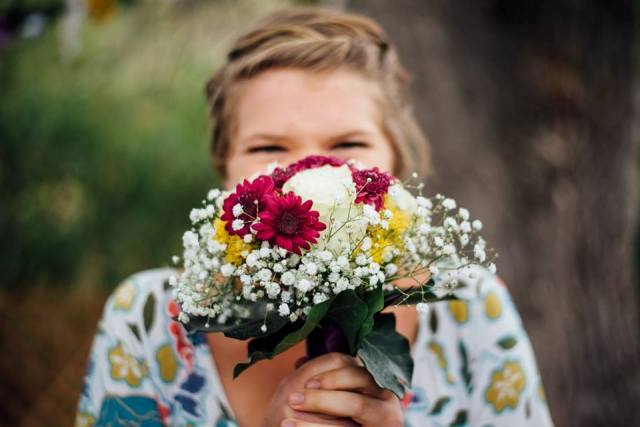Living Without a Self
By Catherine Masters
I have been living for the past five months at Green Gulch Farm Zen Center in Marin County, California, and learning many things during this time. While working in Green Gulch’s famous garden, I have learned how to identify, propagate, cultivate, irrigate, harvest, arrange, and adore flowers. I have learned to live in the fullness of an intimate community. Through zazen, or Zen meditation (more colloquially referred to as “sitting”), I have learned to be still.
I have learned to stop and realize the complexity of a moment or a being, and to fall in love with it all deeply. I have learned the importance of accepting a life filled with suffering — acknowledging that the intangible, ineffable richness and vivacity of our short life is partly due to our human awareness that this will all end. I have learned to look at myself with so much clarity and care that my sense of emptiness and loneliness began to expand beyond myself, encapsulating the entirety of the world and the cosmos.
I have learned what exists behind the mask of what our culture commonly understands to be “Zen,” while also learning what exists integrally in my inner-self, underneath the mask that I have worked so hard thus far in my life to create.
My life at Green Gulch would not be easily associated with the word “Zen” in our society — it is not massages, yoga pants, and “relaxing.” It is, however, awakening. In order to learn so many things about myself, and the world, in such a short time, I have had to spend many, many hours sitting quietly in a room filled with other people doing likewise. I have had to attend many classes on Buddhist history, philosophy, and mythology, as well as many “Dharma Talks,” or lectures given by a priest, on the world that we live in, and our lives in it, and how we can apply the teachings of the Buddha to understand it all.
I have had to wake up most every day well before the sun rises and go to bed well after it sets. I have had to chant and bow (a lot). I have had to follow a rigorous schedule that leaves little-to-no free time, and have had to learn to let go — let go of my arrogance, let go of my preconceived notions, let go of my insecurities, let go of my biases — and allow myself to be humble to this process. As someone who has studied science and identifies as an Atheist, I felt comforted by the easily seen proof that this process, this way of life, works.
I could see it in the soft wisdom, wonder, and patience in the elders of this community; I could see it in myself, in the softening of my edges until I could begin to comfortably and earnestly fade into the reality of each moment. Through the lifestyle here I have learned, perhaps most importantly, to let go of who I have conceived myself to be my whole life, and to let that identity, that mask, dictate my actions and moods.
The concept that there is not really a “self” inhabiting our bodies and running our lives is one of the principal and dogmatic teachings of Buddhism. Many people react rather incredulously when they first learn that Buddhists do not believe in a self, rightfully so. There is, clearly, a me, a you, and a multitude of beings that surround us all everyday. That can be easily proven just by being an existential and sentient being, can’t it?
I find that it is important to clarify that the Buddhist understanding of non-self is not that there is no “you” existing at all — it is instead the understanding that the “you” that exists is not a permanent entity. You are a being or a self that is constantly in flux, both physically and psychologically. This is still not something that a lot of people accept, and that is fine. It is true for me, and has provided me with a previously unknown sense of liberation.
I do not feel as attached to who I have previously believed myself to be; or more precisely, the persona I have been slowly building upon throughout my life, someone who can easily be identified as “me.” Of course, it has been hard to fully let her go; quite honestly, I realize and know that she is still here most of the time. After all, she has been “me” for the entirety of my life up to this point.
That Catherine was anxious, arrogant, clever, knowledgeable, nerdy, and maternal. She was prone to impatiently falling in love, and not too keen on snakes or being patronized. She loved museums, science fiction, and being perceived as competent. She was afraid of growing old, true intimacy, and getting left behind or excluded from social gatherings. She loved to dance and play board games, and talk about great apes.
She never thought of herself as conventionally or classically beautiful, but had accepted that a lot of people perceive her to be “cute” or “adorable” nonetheless. She craved validation, but also craved the image of someone who did not crave such things. She lost her temper when things lost the order that she perceived them to have, and became sad when people didn’t show that they loved her in the way that she expected them to love her.
She clung to her insecurities as something that defined her. She did not let people touch her because she didn’t understand why they’d want to. She felt perpetually guilty about everything — how privileged she was, how she sometimes felt a perverse pleasure from proving somebody wrong, how her anxiety was a suffering that she didn’t deserve because she hadn’t known any real suffering, or how sometimes she just didn’t want to be responsible, as she was expected to be her entire life.
She felt immense love, but often with an edge of separation. She adored animals, and all the ways that they were different from her, and all of the ways that they were the same. She loved picturing certain lives she could have one day — daydreams involving sunny lofts or sunny cabins or sunny gardens. It was hard for her to stay happy without the sun.
That self, that me, is still here. The self that exists writing right now is, undeniably, the result of all that I have been in the past. I could not be where I am now without having travelled the path that I did, exactly as I did. However, the realization that comes with practicing stillness is that none of it is necessarily me right now just because it had been me before. The me that exists right now is full and expansive enough. She is complex enough.
She holds her path inside her every moment, and then releases it, to feel the texture of the wood beneath her feet. The entirety of my precious life floods in during every moment, and then passes on through so that I can feel the contrast of the barely-perceptible soft breeze resting with the intense heat of the noon sun on my skin. I can feel the wholeness of who I was, dance with the wholeness of who I am, every moment that I am still.
It is humbling and enlivening. It is honest and genuine. It is visceral, tangible, and real. It is fleeting and impermanent. In our culture the term “Zen” is often associated with images of peace. It seems to me that a lot of people believe that meditation brings about a sense of peace, of no longer feeling anger, frustration, impatience, sadness, depression, stress, or angst. It is believed that meditation will bring about a calm self. For some people, this may be the case.
However, for me — and as far as I can tell, for many of the fifty-or-so people who practice here with me — that sense of calm is not the real potency of what actually manifests from sitting still. Instead, the manifestation is a full awareness and acceptance. “Negative” emotions still arise for many of us here — I myself still regularly feel anxious, guilty, lethargic, arrogant, and petulant. I still complain and feel uncomfortable and irritable.
However, through practicing stillness I can watch those sensations arise with a sense of curiosity and detachment. I can sit and fully experience my existence every moment, in all of its myriad facets, and wonder at it: Why am I feeling anxious? Why does that worry me? Do I need to worry about that? Where am I right now? What does this present moment feel like?
I accept that I can feel entirely frustrated and sad and grateful and joyous all at once. The existence of one sensation in my mind and body does not negate the actuality of another. Through practicing stillness, mindfulness, awareness, and compassion (for myself as well as others), often a sense of calm does arise — but it is a calm separate from relaxation. It is acceptance. It is love — true, unconditional, unbridled, untethered, unfiltered.
This acceptance is present in the realization that I will die, and the accompanying potency that that provides to my living experiences. It is fully living in the hormone-driven emotions of lust, dis-temper, tiredness, hunger, anxiety, depression, and petulance. It is the fear that this whole feeling, this awareness of life, will end and be replaced by the me who escaped pain by watching far too much television, who wallowed in the feelings of inadequacy that had characterized so much of her life.
This acceptance is not allowing the fact that I was unhealthy so often in the past affect the knowledge that I am healthy now. It is the full joy at desiring no other life, in this moment, than one in which I dedicate myself to loving deeply, and to letting those who I love know just how special they are; It is the joy and release in accepting that I am someone who I love deeply, and who likewise deserves to be made to feel special by me. It is looking in the mirror and seeing myself as truly beautiful just because I am alive.
Every moment is a spontaneous creation of a myriad of factors beyond any one being’s scope of understanding. My life at Green Gulch has taught me to revel in the unknown wonder that each moment provides, to react with earnestness to the suffering of the world, and to live genuinely with myself and with others. It has taught me to look under the mask of those who surround me to see them truly as the entirely complex, unique, indescribably beautiful and unknown splendor that exists beside me in that moment. It has taught me to look under my own mask, and to love the raw potential of my beating body and irascibly stimulated mind with unhindered compassion and awe.
Catherine currently lives at Green Gulch Farm Zen Center in Muir Beach, California where she also works as a garden apprentice. She spends her days meditating, tending to flowers, herbs, and fruit trees, bowing, walking in the perpetual mists, and listening to wise people. She currently has no future plans, and is slowly and surely coming to terms with that. She writes a blog about the gift and trial that is living at a Zen monastery as a 23-year-old girl in her blog at: zenatheism.blogspot.com.


I love the potency that comes with being at ease with what is, no matter how uncomfortable what is is. You express that beautifully!